By all accounts, Keanu Reeves is a good person for whom scores of people vouch for in terms of his decency. It is said that all industry insiders have a “Keanu story,” and this has become increasingly relevant with the pop-culture phenomenon known as “The Keanussance,” the center of whose universe is the John Wick franchise, which just released its fourth installment as well as a spinoff. However, Reeves’s off-screen persona appears at odds with this recent “career revival” (I would argue he has always been a star). As far as I can tell, there are two elements at play in the Keanussance: first—and I agree on this count—Keanu Reeves is a good-looking man who exudes a lot of unconventional and magnetic charisma. Second, and more importantly, is America’s deeply unhealthy obsession with guns.
I wish these two things were not intertwined, and thus I wish this form of the Keanussance didn’t exist. Couldn’t he have instead stepped in as Willy Wonka? There is a massive disconnect that cannot simply be explained away with, “well, the man is an actor.” Sorry, what we have here is someone who supposedly, off screen, is a fine individual, yet in his professional life he is glorifying, to the next order of magnitude, one of America’s worst problems (if not the worst): gun violence.
Have you seen any of these films? John Wick, played by Keanu Reeves, under the guise of the incredible neologism “gun-fu,” goes through several scenes killing scores and scores of people, most of them completely unknown characters, even unknown to Wick himself, with direct shots to the head. It’s disgusting, not entertaining (to me), and I think harmful in terms of our efforts to solve a major problem in this country where you simply replace John Wick with Adam Lanza. Does this make me Tipper Gore? If so, then I’m just going to fully lean into my Tipperness. Let’s go Tipper!
Here’s Keanu Reeves on his interest in the John Wick role:
I guess it starts with the script and the character but also what the story is. Who is involved with it matters too and it all comes down to personal taste. For this, I really liked the character of John Wick and I really liked the tone as well where it's this real-world aspect mixed in with this underworld of criminals. I like the rules and the code; it just had something fresh about it.
This must be the code of, “only a good guy with 75 guns kills 10,789 bad guys with a gun over the course of four films.” Why yes, how…“fresh.” One never sees films about assassins these days.
Now I’m not saying censor these films. What I am saying to Keanu Reeves, directly (he’s certainly a free subscriber, as all subscriptions are free here), is to not do such films and not to lend them the credibility of your ethos. If you want to have lunch, I know lots of places in my town and we can talk it through—name the cuisine and I will deliver in spades. I’m a writer; I can pitch you a perfectly fine gunless script.
I know, I know, a lot of readers are saying, “But what about The Matrix? Isn’t that just as bad?” Nope, nope, and nope. Here’s why: guns in The Matrix, for the most part, serve the express purpose of showing how Neo’s abilities transcend the need for guns as weapons. Neo, played by Reeves, nullifies guns. Guns are then props not to fill our bottomless death-by-bullet gluttony, but instead serve as a device similar to that of, say, Superman: since guns cannot equal the power of the beings being attacked, the guns are thus rendered irrelevant. If only this were the case in our world.
A strong influence on the John Wick films is John Woo, another celebrated gun pornographer, featured in the recent issue of The New Yorker, just in time for his new bullet-filled-Christmas-themed, Silent Night. (For the record, if you want to see how bad John Woo films are, watch Mission Impossible 2—you will immediately see why he had no further participation in the franchise.) Woo, like Reeves, is presented as an extraordinarily conscientious person—someone who on the inside really just wants to make musicals and believe that love conquers all.
Here’s an amazing quote from Mr. Woo, director of Hard Boiled, The Killer, and Bullet to the Head (note, he renamed himself “John” after John the Baptist):
I’m also crazy about musicals. I must have watched West Side Story twenty times in the theatre. I kept chasing after that movie, from urban movie theatres to the countryside. I saw Singin’ in the Rain and The Wizard of Oz so many times. I find a kind of beauty in those movies: people look beautiful, and the songs are beautiful, too, and the movies are always full of hope for a beautiful life. I was raised in a slum, and musicals really made me dream. That’s why I wanted to dance like West Side Story, you know? I still love musicals and really want to make one.
I guess he never got around to making Singing in the Blood Bath or Follow the Brain-Splattered Road because his interest in dancing, when he really thought deeply about it, just so happened to look like fight choreography:
When I was just starting out, I apprenticed for Chang Cheh, a director whom I admired so much, at Hong Kong’s Shaw Brothers Studio. I learned from Chang that action choreography is like ballet dancing. I was so amazed by the way stuntmen punch and kick, as well as how their bodies move. That gave me the idea to create my own style of action, combining dance and martial arts.
Ah yes, nothing makes me think of the ballet more than watching Hard Boiled, especially when Chow Yun-fat slides down a railing, a gun in each hand, mowing down a bunch of “guys.” Eat your heart out Gene Kelly.
As to Mr. Woo’s influences, which represent a violent family tree extending to the sprouted branches of John Wick:
Woo informally studied a range of filmmakers and styles, including the musicals of Jacques Demy and Bob Fosse, the Westerns of John Ford and Sam Peckinpah, and the crime dramas of Jean-Pierre Melville and Martin Scorsese. He also worked as an assistant director to the prolific martial-arts director Chang Cheh, whose blood-soaked kung-fu bromances also greatly inspired Woo’s “heroic bloodshed” action dramas, like A Better Tomorrow (1986), The Killer (1989), and Hard Boiled (1992), all three of which star Chow Yun-fat. Woo developed an international following; his American admirers included Scorsese, Oliver Stone, and Quentin Tarantino—and moved to Hollywood in 1992.
You will note that all the people mentioned are men [Tarantino is the worst]—later, there is mention of Woo’s deep love for Clint Eastwood, especially the Dirty Harry films. There is a single woman mentioned in The New Yorker piece—the former head of Paramount Pictures, Sherry Lansing—for giving Woo complete freedom in his direction of the popular film Face/Off. (I actually like this movie!)
Keanu, if I may call you that, you know who wouldn’t pull this kind of self-undermining nonsense? Taylor Swift. She writes songs about breaking up with boyfriends, not indiscriminately murdering them.
I wish this would all just stop. I’ll throw out a challenge I issued many years back: I challenge one major studio to announce that for a calendar year they will not release one film that includes guns. And guess what? Those can include action films and police procedurals—it is only our imagination that limits us in this case. Back during lockdown Covid, me and my wife started watching a bunch of British police procedurals. We noticed something very odd to us as Americans: the appearance and use of guns was very rare.
Yes. More of that please.

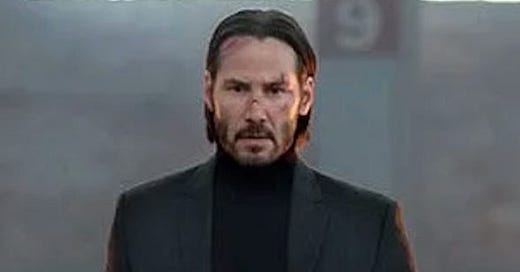



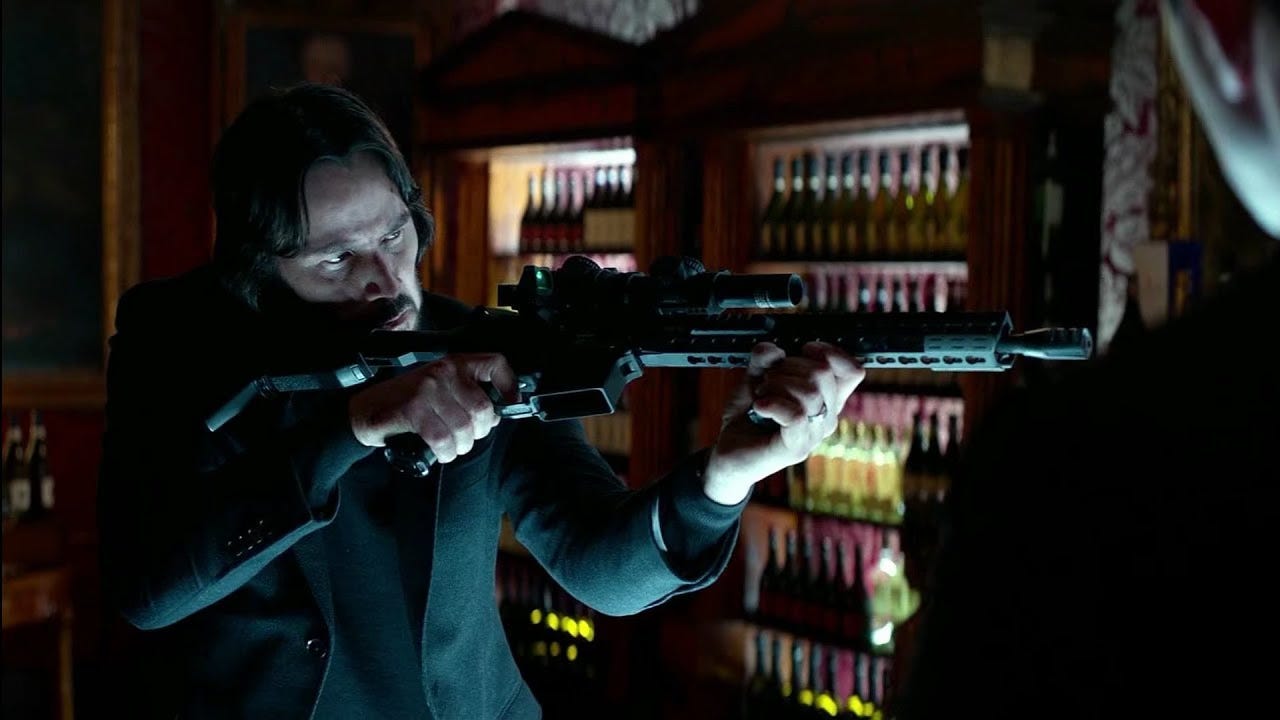
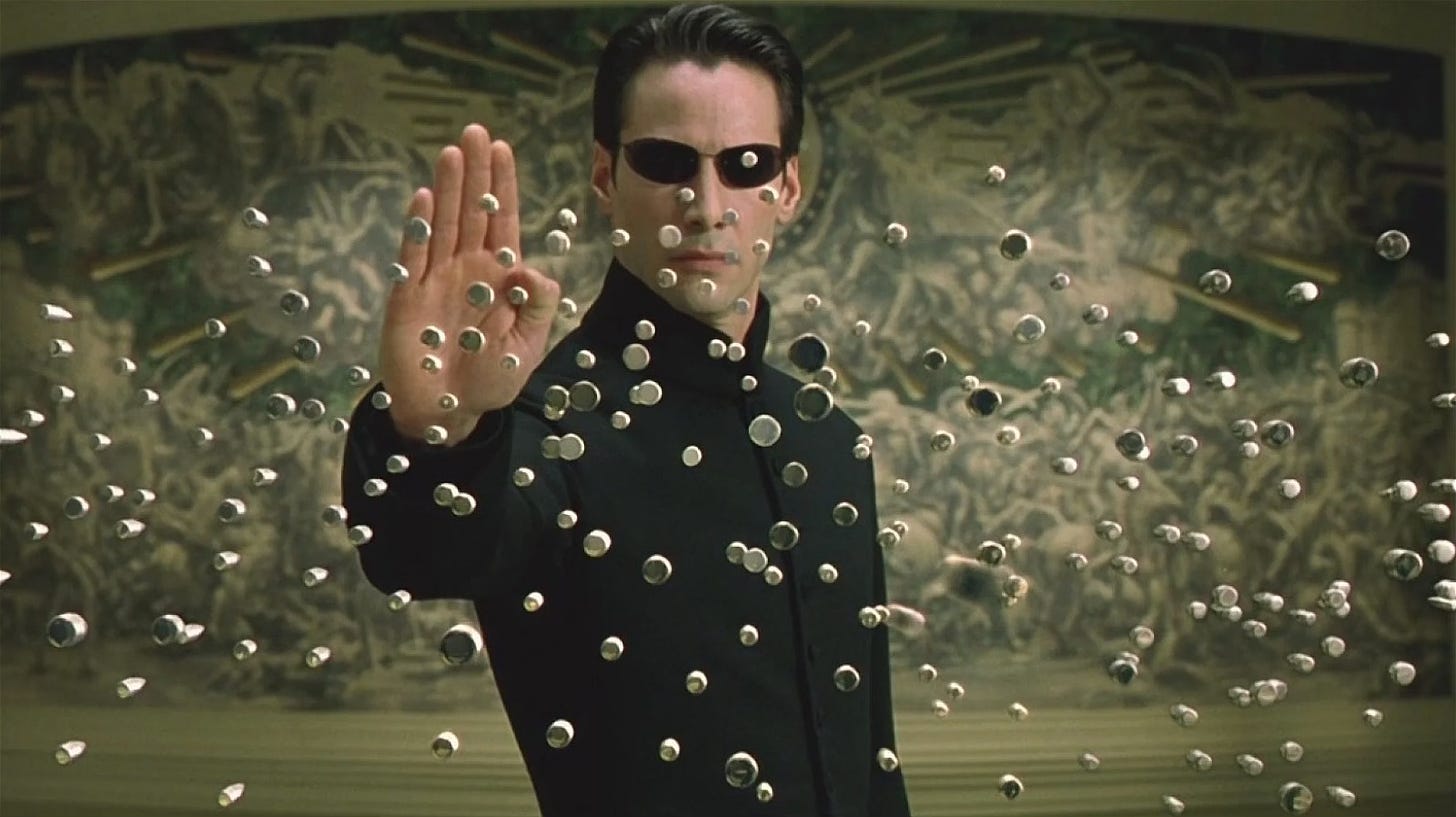
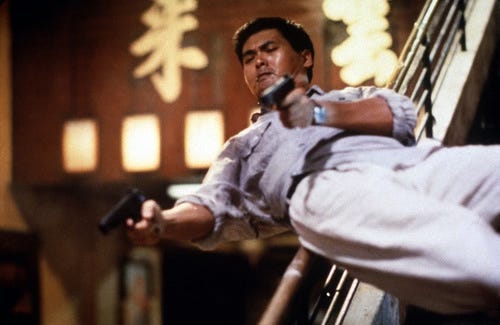
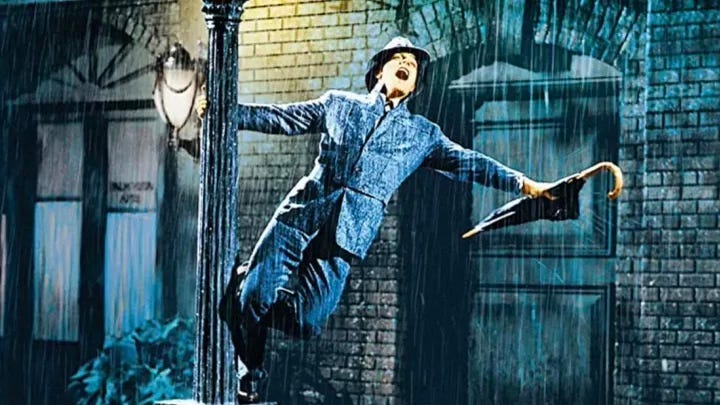
If you want to have a gun-less Hollywood, you have to disarm the NRA first. It's their fault.